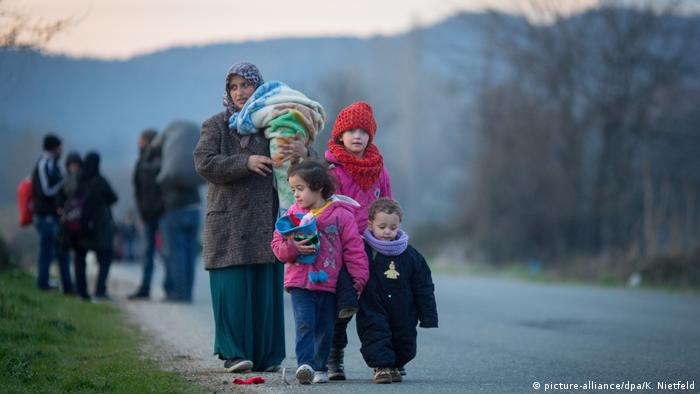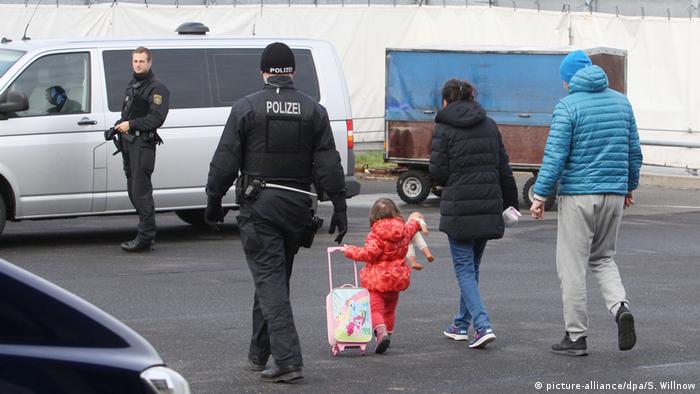Migrant, refugee, asylum seekers, and immigrants: Many terms, and even experts get confused sometimes. The DW explains.

Who qualifies as a Migrant?
A Migrant is, in principle, anyone who moves to another place within their country or across national borders. Of migrants, the talk is usually when someone leaves his native country of their own accord, without that he is in danger, but to improve, for example, to its conditions of life.
Who qualifies as a refugee?
Legally qualifies as a refugee – in contrast to a migrant who falls under the provisions of the Geneva Convention on refugees. A refugee is, therefore, who had to leave because of his race, Religion, nationality, political opinion or membership of a social group, his country of origin. In the last years, the emergence of the notion of “climate refugees” – people fleeing due to climate change, because they can, for example, not living from the agricultural income in their homeland due to climate – are not included in the Geneva Convention.
Who is an asylum seeker?
People who have made an asylum application has not been decided on yet, are asylum seekers or asylum seekers. The decision on the application for asylum by the Federal office for Migration and refugees (BAMF). It assesses whether an applicant for asylum is entitled, if he receives refugee status, or whether both will be denied. Until a decision is made, and must live with the people only in homes and not initially work.
Who qualifies as a migrant?
Immigrants all people who come to Germany are, in principle, regardless of how long or to what purpose they come here. You can be migrated for various reasons, for professional reasons, as refugees, for a course of study or training. Of immigration in the official language, however, “if the entry and stay are planned from the outset to be permanent and approved”. So the Federal government writes it on your Website. The terms “immigrant” and “immigrant” are often treated as synonyms – they are not. Therefore, the debate about whether Germany is now a ” -” or a “country of immigration” is of importance.
Who is entitled to asylum in Germany?
In the German basic law, persons Persecuted for Political reasons enjoy asylum”.” As a politically persecuted, who is excluded from his state because of his political beliefs so strongly that his human dignity is violated. Emergency situations such as economic poverty not entitle them to asylum. After the fall of the Eastern bloc, and the large immigration movement from Ex-Yugoslavia in the beginning of the 1990s, the reason it was restricted the right to asylum: Political asylum is only the one who does not come from a so-called safe country of origin enjoys.
What is a safe country of origin?
A safe country of origin followed his population, not politically and not practiced inhuman or degrading punishments. Citizens from safe countries of Origin can be deported. All asylum-seekers in Germany must get a legal Chance to prove that to him in his home state of political danger. An application for Asylum from people from safe countries of Origin is rejected in the rule, unless special circumstances can be cited. In the year 2017 in this respect is kindled in Germany, especially to deportations to Afghanistan in a dispute.

Police officers will accompany the rejected asylum seekers at the airport Halle-Leipzig
What changes does the “asylum package” of 2016?
The package is a new, accelerated asylum procedures were introduced. Within a week it will be decided on an application for asylum, in the case of a refusal, the deportation will take place within three weeks from the accommodation facility. The Grand coalition of CDU/CSU and SPD has long wrestled with this package.
An important point here: The family reunification for relatives of the “person entitled to subsidiary Protection” shall be suspended for two years. Persons entitled to subsidiary protection are those refugees who do not meet the requirements of refugee status under the Geneva refugee Convention, which, however, in their state of origin is a serious threat is imminent. And although you may not catch up with their families, they themselves will be deported.
What happens if an asylum application is rejected?
An asylum application is rejected in Germany, and is not recognized a Person as a refugee, must leave Germany. It is under threat of deportation. By contrast, the asylum seekers can complain. Up to the time of deportation, or in the event that a departure is not possible, get these people a tolerance. Reasons for this can be illness, lack of documents or the situation in a specific country. It also applies to minors who are without adult on the run.
Who qualifies as a so-called “quota refugees”?
In Paragraph 23 of the German residence act, it is provided that all of the refugees that come from a specific state or a specific group, a permission to stay. Quota refugees enjoy, so to speak, a state permit issued for an exception. Quota refugees asylum must go through method, can not choose their place of residence in Germany, but first of all also free. Quota refugees are distributed in accordance with the königstein key to the länder. Prerequisite: international law or humanitarian reasons or the “safeguarding of political interests of the Federal Republic of Germany”. Such exceptions, may decide the Federal or the Länder. Potential candidates can.for example, when a refugee charity UNHCR or in German consulates report and obtain an appropriate residence permit in Germany and work remain
What is the meaning of the Dublin procedure?
In Germany, it is not a decision on each asylum application. According to the European Dublin regulation, the EU country is, in principle, responsible for the asylum procedure, the asylum-seekers to enter the end of the first. This state is known and is considered to be safe, to be refugees deported without further testing there and can there apply for asylum. The so-called “Dublin II” regulation of 2003 has created in the past few years, especially since 2015, more and more critics on the Plan, especially since then, thousands of refugees still live in Greece and more travel. They complain that many of the EU States “Dublin II” as a justification, the need for them to no the in Greece, the seated refugees.